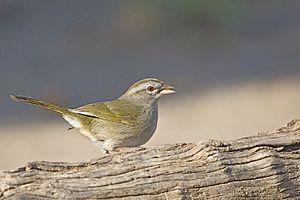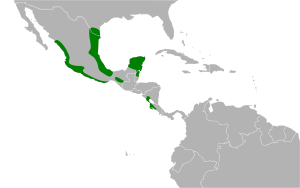Olive sparrow facts for kids
Quick facts for kids Olive sparrow |
|
|---|---|
 |
|
| Conservation status | |
| Scientific classification |
|
| Kingdom: | Animalia |
| Phylum: | Chordata |
| Class: | Aves |
| Order: | Passeriformes |
| Family: | Passerellidae |
| Genus: | Arremonops |
| Species: |
A. rufivirgatus
|
| Binomial name | |
| Arremonops rufivirgatus (Lawrence, 1851)
|
|
 |
|
| Script error: The function "autoWithCaption" does not exist. | |
Script error: No such module "Check for conflicting parameters".
The olive sparrow (Arremonops rufivirgatus) is a small, pretty bird that belongs to the American sparrow family. You might also hear it called the green finch or Texas sparrow! These birds live in several countries, including Belize, Costa Rica, Guatemala, Honduras, Mexico, Nicaragua, and the southern part of Texas in the United States.
Contents
Discover the Olive Sparrow
What Does the Olive Sparrow Look Like?
The olive sparrow is about 14 to 15.5 centimeters (about 5.5 to 6 inches) long. It's special because it's the only sparrow with an olive-colored back!
This bird has a clear brown stripe near its eye and a brown-striped pattern on top of its head. Its chest is a soft, light brown color, and it has some white feathers on its belly. It also has a cone-shaped beak, which is perfect for eating seeds.
Both male and female olive sparrows look very much alike. Young olive sparrows, called juveniles, are a bit more buff-colored and have some stripes on their belly. The olive sparrow looks a little like the green-tailed towhee, but it's smaller and doesn't have a reddish-brown cap on its head.
Where Do Olive Sparrows Live?
Olive sparrows do not migrate, which means they stay in the same area all year long. They like to live in thick bushes, chaparral (a type of shrubland), and undergrowth near forests. You can find them from sea level up to about 1,800 meters (6,000 feet) high.
Male olive sparrows sing simple chip notes. These sounds are not very musical and are similar to the calls of the swamp sparrow.
Olive Sparrow Nesting and Life Cycle
The olive sparrow builds its nest about two to five feet (0.6 to 1.5 meters) above the ground. Their nests are quite large and are made from things like straws, small twigs, bark, leaves, and plant stems.
Female olive sparrows usually lay two to five eggs in each nesting season. The nesting season runs from March to September. Their eggs are white and do not have any spots.
More About the Olive Sparrow
Research and Studies
Scientists and students have studied the olive sparrow to learn more about its life and the places it lives. Here are some examples of their work:
- One study looked at how many birds were born at a wildlife refuge in Texas between 1995 and 1999.
- Another research project explored what affects the success of nests for birds that are hosts to the bronzed cowbird in Texas.
- A comparison was made between different types of woody plants in two fields in South Texas. This study also looked at how the olive sparrow used these areas as its home.
See also
 In Spanish: Cerquero oliváceo para niños
In Spanish: Cerquero oliváceo para niños
Images for kids
 | Mary Eliza Mahoney |
 | Susie King Taylor |
 | Ida Gray |
 | Eliza Ann Grier |




